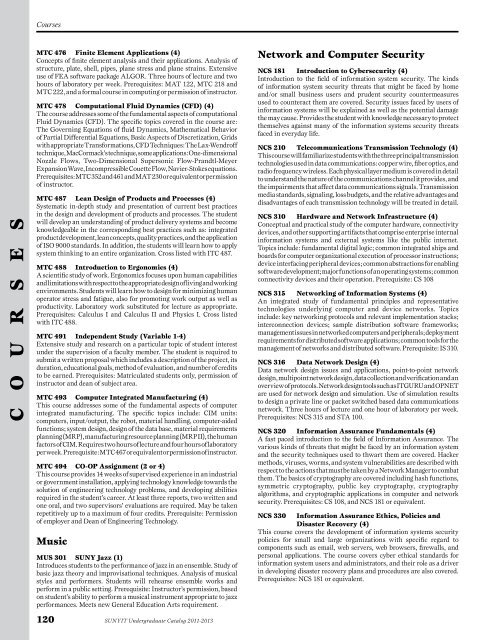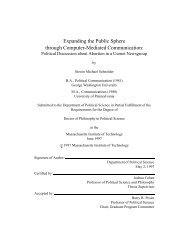Undergraduate Catalog 2011-2013 - SUNY Institute of Technology
Undergraduate Catalog 2011-2013 - SUNY Institute of Technology
Undergraduate Catalog 2011-2013 - SUNY Institute of Technology
Create successful ePaper yourself
Turn your PDF publications into a flip-book with our unique Google optimized e-Paper software.
Courses<br />
C O U R S E S<br />
MTC 476 Finite Element Applications (4)<br />
Concepts <strong>of</strong> finite element analysis and their applications. Analysis <strong>of</strong><br />
structure, plate, shell, pipes, plane stress and plane strains. Extensive<br />
use <strong>of</strong> FEA s<strong>of</strong>tware package ALGOR. Three hours <strong>of</strong> lecture and two<br />
hours <strong>of</strong> laboratory per week. Prerequisites: MAT 122, MTC 218 and<br />
MTC 222, and a formal course in computing or permission <strong>of</strong> instructor.<br />
MTC 478 Computational Fluid Dynamics (CFD) (4)<br />
The course addresses some <strong>of</strong> the fundamental aspects <strong>of</strong> computational<br />
Fluid Dynamics (CFD). The specific topics covered in the course are:<br />
The Governing Equations <strong>of</strong> fluid Dynamics, Mathematical Behavior<br />
<strong>of</strong> Partial Differential Equations, Basic Aspects <strong>of</strong> Discretization, Grids<br />
with appropriate Transformations, CFD Techniques: The Lax-Wendr<strong>of</strong>f<br />
technique, MacCormack’s technique, some applications: One-dimensional<br />
Nozzle Flows, Two-Dimensional Supersonic Flow-Prandtl-Meyer<br />
Expansion Wave, Incompressible Couette Flow, Navier-Stokes equations.<br />
Prerequisites: MTC 352 and 461 and MAT 230 or equivalent or permission<br />
<strong>of</strong> instructor.<br />
MTC 487 Lean Design <strong>of</strong> Products and Processes (4)<br />
Systematic in-depth study and presentation <strong>of</strong> current best practices<br />
in the design and development <strong>of</strong> products and processes. The student<br />
will develop an understanding <strong>of</strong> product delivery systems and become<br />
knowledgeable in the corresponding best practices such as: integrated<br />
product development, lean concepts, quality practices, and the application<br />
<strong>of</strong> ISO 9000 standards. In addition, the students will learn how to apply<br />
system thinking to an entire organization. Cross listed with ITC 487.<br />
MTC 488 Introduction to Ergonomics (4)<br />
A scientific study <strong>of</strong> work. Ergonomics focuses upon human capabilities<br />
and limitations with respect to the appropriate design <strong>of</strong> living and working<br />
environments. Students will learn how to design for minimizing human<br />
operator stress and fatigue, also for promoting work output as well as<br />
productivity. Laboratory work substituted for lecture as appropriate.<br />
Prerequisites: Calculus I and Calculus II and Physics I. Cross listed<br />
with ITC 488.<br />
MTC 491 Independent Study (Variable 1-4)<br />
Extensive study and research on a particular topic <strong>of</strong> student interest<br />
under the supervision <strong>of</strong> a faculty member. The student is required to<br />
submit a written proposal which includes a description <strong>of</strong> the project, its<br />
duration, educational goals, method <strong>of</strong> evaluation, and number <strong>of</strong> credits<br />
to be earned. Prerequisites: Matriculated students only, permission <strong>of</strong><br />
instructor and dean <strong>of</strong> subject area.<br />
MTC 493 Computer Integrated Manufacturing (4)<br />
This course addresses some <strong>of</strong> the fundamental aspects <strong>of</strong> computer<br />
integrated manufacturing. The specific topics include: CIM units:<br />
computers, input/output, the robot, material handling, computer‐aided<br />
functions; system design, design <strong>of</strong> the data base, material requirements<br />
planning (MRP), manufacturing resource planning (MRP II), the human<br />
factors <strong>of</strong> CIM. Requires two hours <strong>of</strong> lecture and four hours <strong>of</strong> laboratory<br />
per week. Prerequisite: MTC 467 or equivalent or permission <strong>of</strong> instructor.<br />
MTC 494 CO-OP Assignment (2 or 4)<br />
This course provides 14 weeks <strong>of</strong> supervised experience in an industrial<br />
or government installation, applying technology knowledge towards the<br />
solution <strong>of</strong> engineering technology problems, and developing abilities<br />
required in the student’s career. At least three reports, two written and<br />
one oral, and two supervisors’ evaluations are required. May be taken<br />
repetitively up to a maximum <strong>of</strong> four credits. Prerequisite: Permission<br />
<strong>of</strong> employer and Dean <strong>of</strong> Engineering <strong>Technology</strong>.<br />
Music<br />
MUS 301 <strong>SUNY</strong> Jazz (1)<br />
Introduces students to the performance <strong>of</strong> jazz in an ensemble. Study <strong>of</strong><br />
basic jazz theory and improvisational techniques. Analysis <strong>of</strong> musical<br />
styles and performers. Students will rehearse ensemble works and<br />
perform in a public setting. Prerequisite: Instructor’s permission, based<br />
on student’s ability to perform a musical instrument appropriate to jazz<br />
performances. Meets new General Education Arts requirement.<br />
Network and Computer Security<br />
NCS 181 Introduction to Cybersecurity (4)<br />
Introduction to the field <strong>of</strong> information system security. The kinds<br />
<strong>of</strong> information system security threats that might be faced by home<br />
and/or small business users and prudent security countermeasures<br />
used to counteract them are covered. Security issues faced by users <strong>of</strong><br />
information systems will be explained as well as the potential damage<br />
the may cause. Provides the student with knowledge necessary to protect<br />
themselves against many <strong>of</strong> the information systems security threats<br />
faced in everyday life.<br />
NCS 210 Telecommunications Transmission <strong>Technology</strong> (4)<br />
This course will familiarize students with the three principal transmission<br />
technologies used in data communications: copper wire, fiber optics, and<br />
radio frequency wireless. Each physical layer medium is covered in detail<br />
to understand the nature <strong>of</strong> the communications channel it provides, and<br />
the impairments that affect data communications signals. Transmission<br />
media standards, signaling, loss budgets, and the relative advantages and<br />
disadvantages <strong>of</strong> each transmission technology will be treated in detail.<br />
NCS 310 Hardware and Network Infrastructure (4)<br />
Conceptual and practical study <strong>of</strong> the computer hardware, connectivity<br />
devices, and other supporting artifacts that comprise enterprise internal<br />
information systems and external systems like the public internet.<br />
Topics include: fundamental digital logic; common integrated ships and<br />
boards for computer organizational execution <strong>of</strong> processor instructions;<br />
device interfacing peripheral devices; common abstractions for enabling<br />
s<strong>of</strong>tware development; major functions <strong>of</strong> an operating systems; common<br />
connectivity devices and their operation. Prerequisite: CS 108<br />
NCS 315 Networking <strong>of</strong> Information Systems (4)<br />
An integrated study <strong>of</strong> fundamental principles and representative<br />
technologies underlying computer and device networks. Topics<br />
include: key networking protocols and relevant implementation stacks;<br />
interconnection devices; sample distribution s<strong>of</strong>tware frameworks;<br />
management issues in networked computers and peripherals; deployment<br />
requirements for distributed s<strong>of</strong>tware applications; common tools for the<br />
management <strong>of</strong> networks and distributed s<strong>of</strong>tware. Prerequisite: IS 310.<br />
NCS 316 Data Network Design (4)<br />
Data network design issues and applications, point‐to‐point network<br />
design, multipoint network design, data collection and verification and an<br />
overview <strong>of</strong> protocols. Network design tools such as ITGURU and OPNET<br />
are used for network design and simulation. Use <strong>of</strong> simulation results<br />
to design a private line or packet switched based data communications<br />
network. Three hours <strong>of</strong> lecture and one hour <strong>of</strong> laboratory per week.<br />
Prerequisites: NCS 315 and STA 100.<br />
NCS 320 Information Assurance Fundamentals (4)<br />
A fast paced introduction to the field <strong>of</strong> Information Assurance. The<br />
various kinds <strong>of</strong> threats that might be faced by an information system<br />
and the security techniques used to thwart them are covered. Hacker<br />
methods, viruses, worms, and system vulnerabilities are described with<br />
respect to the actions that must be taken by a Network Manager to combat<br />
them. The basics <strong>of</strong> cryptography are covered including hash functions,<br />
symmetric cryptography, public key cryptography, cryptography<br />
algorithms, and cryptographic applications in computer and network<br />
security. Prerequisites: CS 108, and NCS 181 or equivalent.<br />
NCS 330 Information Assurance Ethics, Policies and<br />
Disaster Recovery (4)<br />
This course covers the development <strong>of</strong> information systems security<br />
policies for small and large organizations with specific regard to<br />
components such as email, web servers, web browsers, firewalls, and<br />
personal applications. The course covers cyber ethical standards for<br />
information system users and administrators, and their role as a driver<br />
in developing disaster recovery plans and procedures are also covered.<br />
Prerequisites: NCS 181 or equivalent.<br />
120 <strong>SUNY</strong>IT <strong>Undergraduate</strong> <strong>Catalog</strong> <strong>2011</strong>-<strong>2013</strong>
















